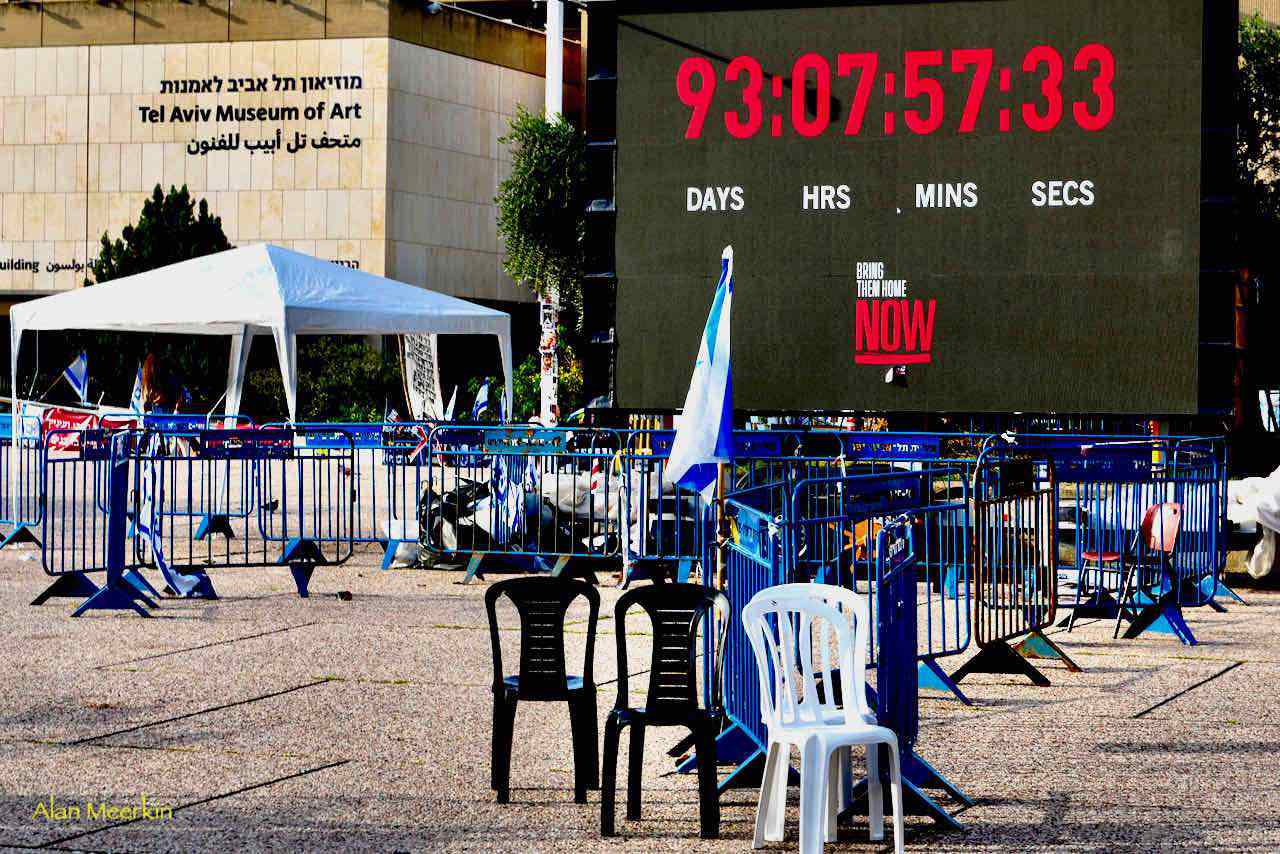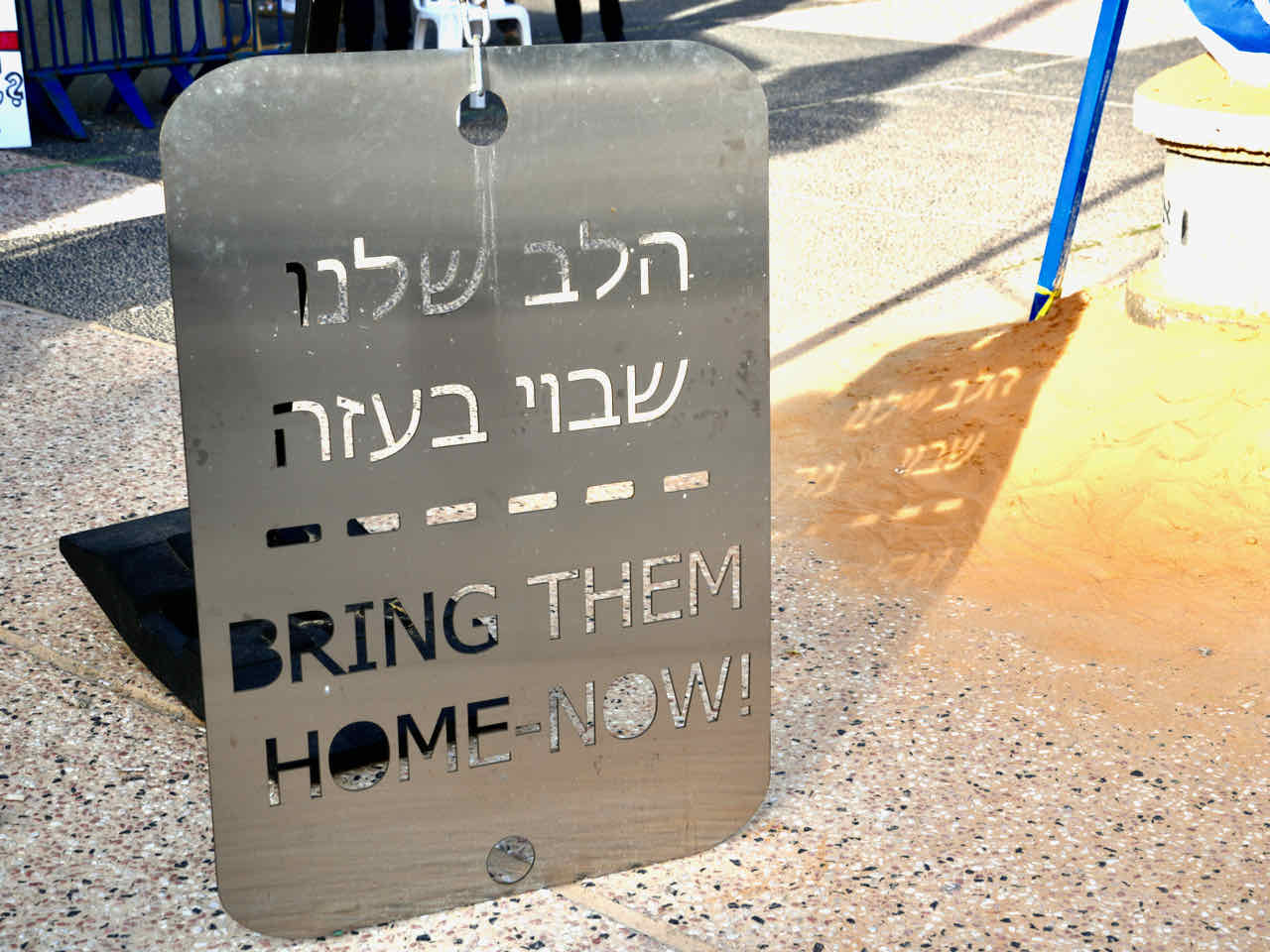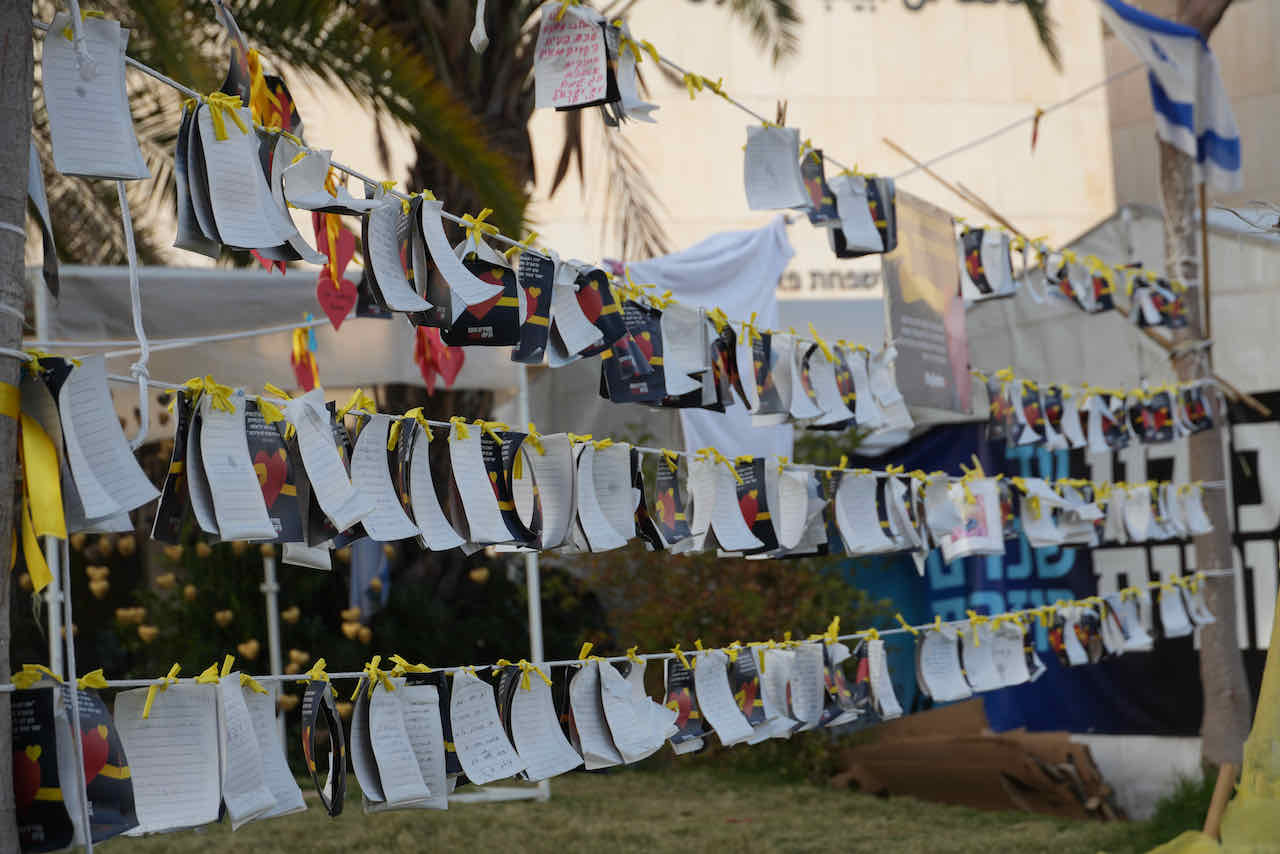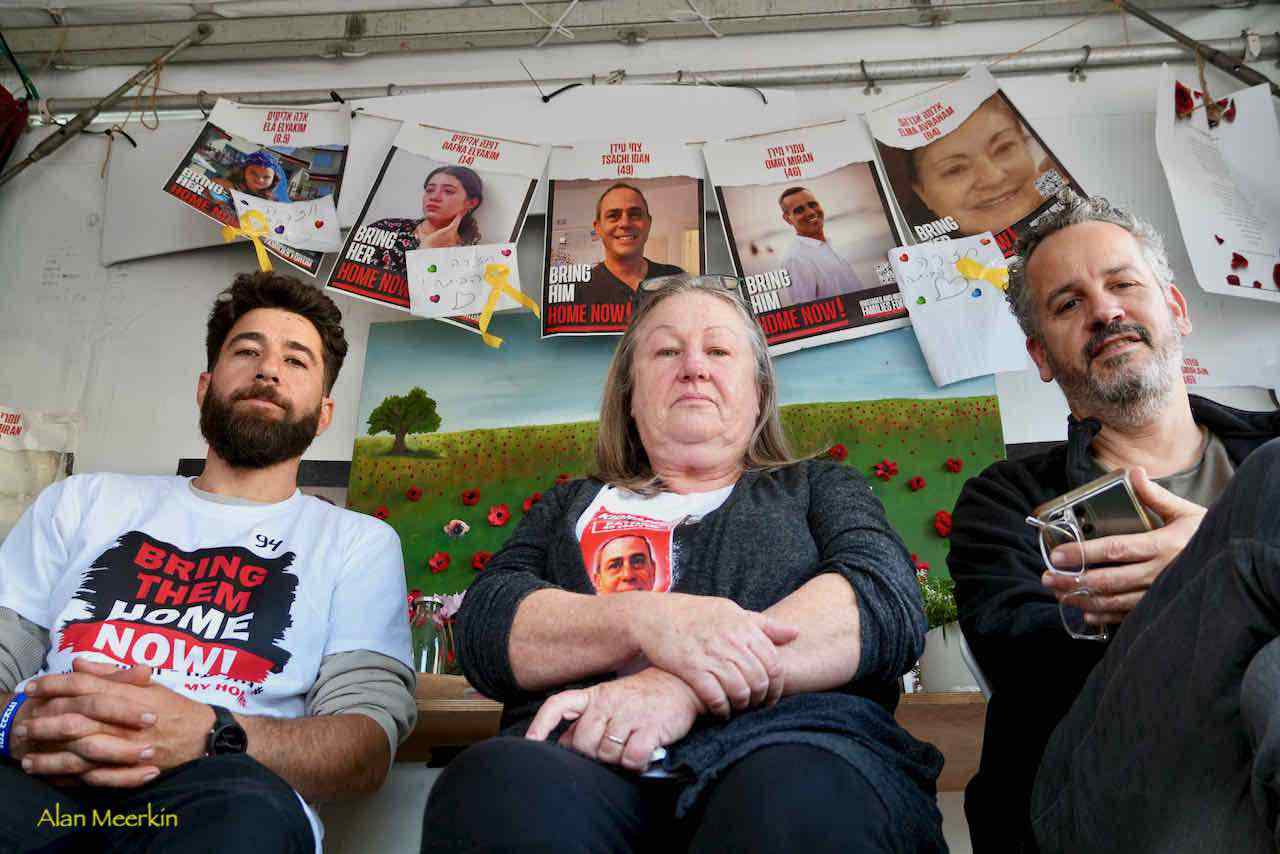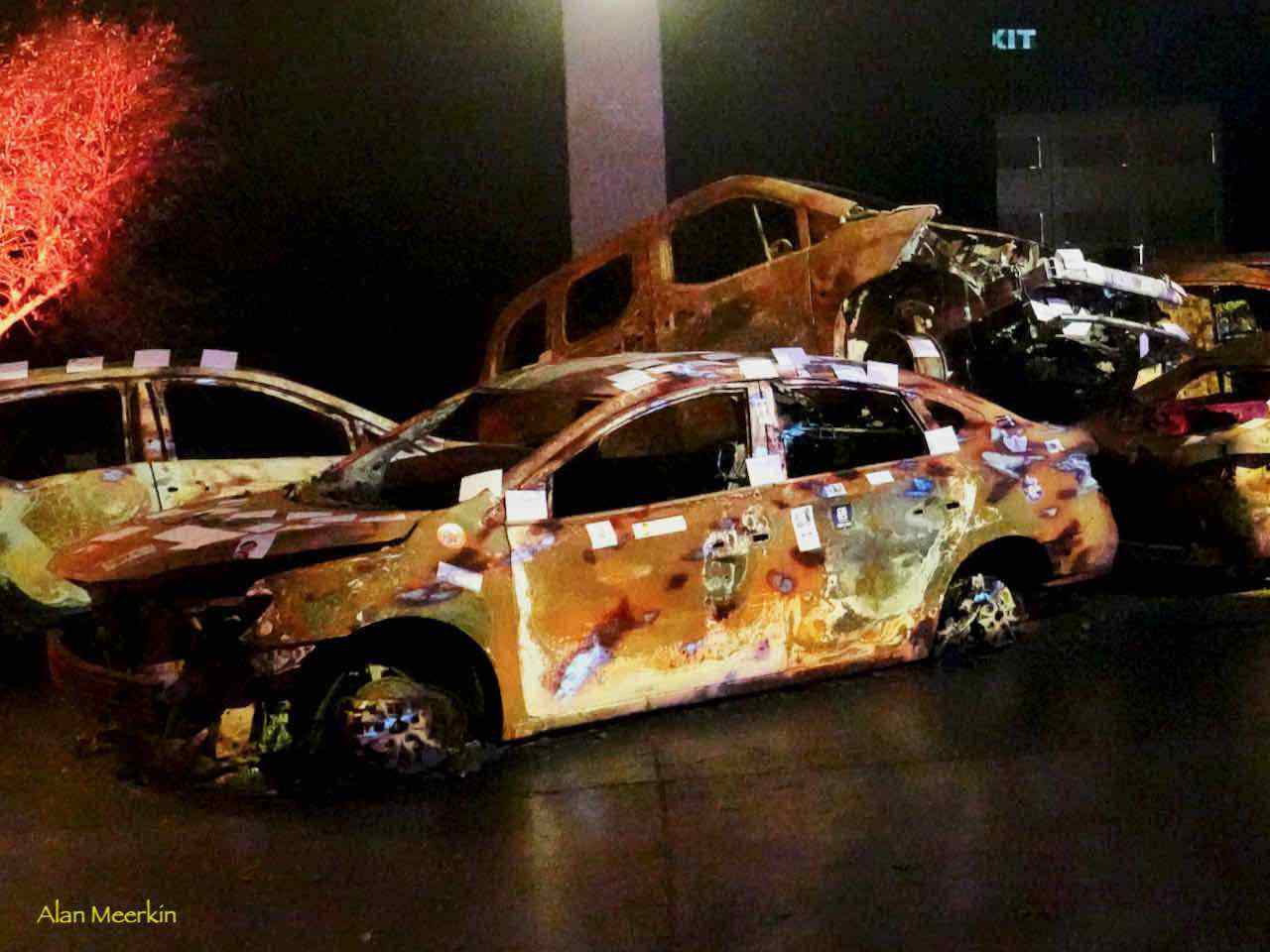These days, people in Israel are living life by going through the motions. Few people greet each other with “How are you doing?” The few that do receive the inevitable response: “Like everyone.”
A World Gone Mad
There is no lightness of being here. The world has been turned upside down. Black is white. Wrong is right. Evil is justified. Self-defence is genocide.
Suddenly, the only things that seem to make sense are the black-and-white stories we heard from our parents and grandparents about Europe in the 1930s and 1940s.
Except that now they are
in colour.
I am reminded of Yehiel Dinur, the witness at the Eichmann trial who fainted while testifying about life in the Auschwitz concentration camp. He described it as another planet, with rules that are different to those of the world with which we are familiar. I now know how he felt.
The knock-on effects of the war are spreading into different spheres, globally. It’s as if Hamas, by crossing the border into Israel on Oct 7 and carrying out a pogrom, stirred up a hornets’ nest, and the hornets are spreading in every direction, looking for things to sting:
- Houthi attacks on Red Sea Shipping;
- Military strikes in Yemen by the US and UK;
- A new world supply chain inflation;
- The flames of war being fanned by Hezbollah;
- Criminal proceedings against Israel in the International Court of Justice;
- Egyptian threats against Israeli activity along its Gaza border;
- The re-activation of medieval anti-Semitism on streets around the world;
- The crystallisation of new-world woke anti-Semitism, including by the great, western, academic institutions (Harvard University and its ilk) that condescendingly view themselves as bastions of civilisation.
Finish Them or Bring Them Home ?
Domestically, the simple war cries of ‘Finish Them’ (re Hamas) and ‘Bring them Home’ (re the hostages) were initially clear enough.
These two rallying calls encapsulate the feeling here. But it 'aint so simple. Are they both simultaneously achievable, or must we choose one over the other? This question dominates the media.
Survival of the hostages in captivity is of major concern. Their release is a priority.
https://www.thejc.com/news/israel/cages-beatings-and-death-threats-freed-hostages-tell-their-story-v811u2cu https://www.barrons.com/news/freed-israeli-women-hostages-tell-of-abuse-in-hamas-captivity-9233146e
Protests petitioning for a deal facilitating the release of the hostages, above all other considerations, have been increasing in scope and intensity.
https://www.washingtonpost.com/world/2024/01/24/israel-hostages-gaza-hamas-families/
What are Israel's options?
Finish them:-
Remove Hamas from Gaza + prolonged fighting = more Israeli soldier casualties + Israeli hostages abused and kept as human shields + hostages exposed to Israeli attacks on Hamas.
Bring them home:-
Hostages released + Hamas convicted terrorists released + cease fire (during which Hamas can regroup + prepare for future battles with Israeli soldiers + prepare for future
terrorist acts + remain rulers of Gaza).
These are not the only possible combinations, but whichever way you cut it, I don't envy the decision makers. As chief decision maker, much flak is directed at Prime Minister Netanyahu. Many believe he is driven by his own fight for political survival rather than the best for the country.
https://foreignpolicy.com/2023/11/27/netanyahu-hold-power-hamas-gaza-likud-israel/
Former telecommunications minister, Yoaz Hendel, suggested a delicate solution: Bibi should recognise that his post-war political career is over. On that basis, personal considerations should not affect his strategising in this conflict.
I think we can all agree that there is fat-chance of that happening.
The Pawns at Play
Every day, our boys walk into a stranger's apartment knowing that from behind the fridge, or the sofa, or the toilet door, or from a tunnel opening in one of the kids’ bedrooms, an unseen face might be pointing a Kalashnikov rifle in their direction. It’s just like being in a video game.
Imagine it.
Sharp banging noises ring out, and flashes of light bounce across the room. Holes suddenly appear in the walls where the bullets have found a target. Our soldiers - accountants and rabbis and computer programmers and shopkeepers and farmers and bus drivers and... and... and.... - shoot back in the direction of the flashes. In an instant, they must keep tabs on their assailants’ positions, on keeping out of the line of fire (where such is even possible), and on covering their platoon mates who are doing the same. It all happens so quickly.
Each one starts yelling now, over and above the gunfire, to his compatriots, a multitude of voices shouting, making the noise in the house unbearable:
“There’s five of them!”
“Back room!”
“Stay back, get in the corner, down! Down!”
One of the young men falls to the ground and convulses. “I’m hit!”
“Medic!”, calls the soldier still standing. He continues shooting in the direction of the gunfire and only hesitates momentarily when a figure bursts through the door. It’s another member of his unit, clearing the rooms.
A helmeted figure, huddled over, comes into view, opening a sterile bandage with his teeth. Apparently the medic, he cowers over the soldier who was hit.
“Get him out of here, get him out!”, shouts our main character at the medic, his rifle butt taking up much of the image being filmed by his go-pro as he shoots his rifle at the bedroom wall. A figure in black slumps down from behind the wall.
“Another terrorist down!”
It was real go-pro footage broadcast on TV last night. In an interview on the same program, a former government minister, himself now serving in uniform, clarified, “It’s not like that everyday. There is a lot of sitting around with the unit and drinking coffee”. Fair enough, I thought. But once in a lifetime is enough for me. And I wouldn't want anyone I know to be in that position.
Videos such as these are also available on youtube. After some deliberation I have decided not to share these links.
Casualties and the Israeli Psyche
Yesterday, twenty-one soldiers were killed by buildings that were toppled by a Hamas fired rocket propelled grenade.
https://apnews.com/article/israel-hamas-war-news-01-23-2024-6f6e893b6dfa05ddf5a81ecb67b72d05
The victims were from a unit of reservists, most in their 30s and married with kids. Many more were injured but were extricated from the debris with herculean effort. They came from all sectors of Israeli society, including a Bedouin, as well as young men whose families had immigrated from Colombia, Peru, the Philippines, and more.
One of the casualties, 35-year-old Elkana Vizel, left a note for his wife and 4 children. His wife read it at his funeral. It went viral:
“If you are reading these words, apparently something has happened to me. If I’ve been kidnapped, I demand that no deal be done to release any terrorist in order to free me. Our absolute victory is more important than anything...Maybe I fell in battle. When a soldier falls in battle it is sad. But I ask you to be happy. Don’t be sad when you say goodbye to me. Touch hearts, hold each other’s hands and strengthen one another. We have so much to be proud and happy for. We are writing the most significant moments in the history of our nation and of the entire world. So please, be happy, be optimistic, continue to choose life all the time. Spread love, light and optimism.”
https://www.timesofisrael.com/wide-swath-of-society-the-stories-of-some-of-the-21-troops-killed-in-gaza-blast/
The country went into unofficial morning for the dead.
A rule of radio broadcast is never to be silent when you are on the air. Yesterday, uncomfortable silences punctuated the usual radio discussions about current events. Sometimes the program
hosts didn’t know how to describe their depth of feeling. At other times they simply ran out of things to say. It was as if a thick pall had descended on the country.
Sweet and Sour
I recently attended a wedding. It had been scheduled for November but was postponed due to the ‘situation’, a word that is used all too often to describe the vicissitudes of life here. The young groom, still at university, had been serving in Gaza and was released in time to get married. Just in time, it turned out, to also attend the funeral, the afternoon before his wedding, of a good friend killed in the fighting.
The wedding was almost unbearably moving. Just like sweet and sour sauce heightens the senses, so, too, the joy of this celebration, mixed with the circumstances, touched everyone present.
The couple was dashing. The food was exquisite. The spirit exuded during the singing and dancing of the many friends there (who included brothers-in-arms of the groom) was simply wonderful, and distracted from the heavy rainstorm that battered the building from the outside.
All for One and One for All
I joined the crowd from the lobby to the chuppa, and bumped into a female friend I had not seen for years. We brought each other up to date on our lives. Her husband, in his 50s and a first responder (ie: on security detail) in the town where they live, is now in the army. He is not alone in uniform; so are a couple of their 5 children. We discussed our heavy feelings about the ‘situation’. Every Israeli, soldier, hostage or civilian, feels like our own.
Black rifles non-nonchalantly dotted the crowd. Another friend of mine, way past military age, had an M16 slung over his shoulder.
“What’s that for?” I asked. He laughed.
“Oh, my boys are in service. The older one went to dance, so I’m holding it for him.”
As the guests assembled for the ceremony, bowls were passed around with slips of paper. Each contained the name of a hostage held by Hamas, of a soldier who had died in the fighting, or of a soldier who had been injured. Everyone was asked to engage with the holiness of the occasion and pray for the soul and well-being on the names we held in our hands.
It was then we were told that the groom’s closest friend from childhood, his bosom buddy, had been an early casualty of the war, and that friend’s father was invited to bless the couple under the chuppa.
The respect paid by the couple to the groom’s departed friend, and the bittersweet moment in which the friend’s father blessed the couple, knowing he could never do this for
his own son, caused numerous silent tears in the hall.
Always in Our Hearts
When the ceremony ended, everyone moved on to the dining area as the band started up. I found my designated seating place and reviewed the salads. Beyond the table, a group of young boys had replaced their white collared shirts for black T-shirts with a face and name printed on them. It was the face of the groom’s bosom-buddy. “Always in our hearts” read the words above the picture.
Postscript
I am writing these lines in the cafe of Jerusalem’s swanky Orient Hotel. Like most hotels, it is currently accommodating some of the few hundred thousand Israeli citizens evacuated from their homes in Israel’s north and south.
The normally demure atmosphere of the hotel has been transformed. Guests, who would rather be in their homes, which now stand quiet except for the periodic sound of Hamas and Hizbollah missiles, are either slumped in armchairs staring at their phones, or chasing squealing kids between the tables. In the cafe, parents pull plastic bags of cookies and cut fruit out of their bags. The staff don’t stop them. On the contrary, I am impressed with their sensitivity towards the guests.
Perhaps I will describe their plight another time.
Everyday life in Israel; that’s the view from here.












